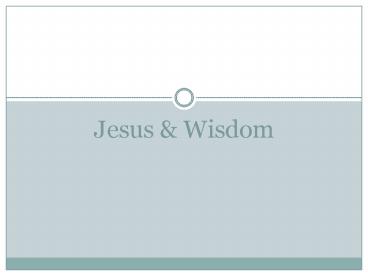Jesus - PowerPoint PPT Presentation
1 / 21
Title:
Jesus
Description:
Jesus & Wisdom Author s addressed questions such as these: What does it mean to be a wise person? What is the meaning and purpose of life? where are we going? – PowerPoint PPT presentation
Number of Views:48
Avg rating:3.0/5.0
Title: Jesus
1
Jesus Wisdom
2
Authors addressed questions such as these
- What does it mean to be a wise person?
- What is the meaning and purpose of life? where
are we going? - Why do good people suffer and bad people prosper?
Why should we be good in a world that is unfair? - How can we live good and faithful lives when
surrounded by those who are hostile to our
beliefs?
3
Wisdom Literature
- Israels wisdom books speak to the individual
about the wholeness and integrity of a good life,
and about the personal disintegration caused by
sin. - The goal of the biblical teachers of wisdom was
to inspire moral integrity.
4
Proverbs
- What is a Good Life?
5
- The book of Proverbs content
- consists of several collections of wisdom
teachings - intended to instruct the youth especially.
- There is no hint of an afterlife
- Most of the sayings do not mention God.
- Describes wisdom as Lady Sophia
- The book of Proverbs the author
- is introduced as the proverbs of Solomon, the
son of David, king of Israel - Solomon was the traditional patron of wisdom, as
David was the traditional composer of psalms.
6
Proverbs
- Proverbs is concerned with how to live a good
life - Its full down-to-earth, practical advice.
- The following are examples..
- Leadership
- If a ruler listens to falsehood,/ all his
officials will be wicked (2912 - Gossip
- A perverse person spreads strife,/ and a
whisperer separates close friends (1628 - Learning
- A fool takes no pleasure in understanding,/ but
only in expressing personal opinion (182)
7
Proverbs God
- Where is God in all this wisdom?
- Most of the sayings do not mention God.
- The perspective of the Jewish sages was the true
wisdom is from God, no matter where we find it - In the advice of family and friends
- In common sense
- In nature
- Even in other cultures with their appealing
wisdom sayings - The sages saw the world as full of Gods wisdom
8
Lady wisdom
- In chapters 8 9, wisdom is portrayed poetically
as a woman who came forth from God in the
beginning before the world was created. - She was with God as the master worker while the
heavens and the earth were made
9
Wisdoms feminine voice
- Proverbs image of Gods wisdom as a woman adds a
feminine voice and quality to the traditional
Jewish image of God as masculine. - This feminine image of wisdom has been called
Sophia - After the Greek word for wisdom- Shekina
- God is neither man nor woman
- God is personal but transcends the human
categories of gender.
10
Biblical tradition
- The biblical writers used male and female images
to describe God because that was what they knew
of persons from their human experience. - Catholic Tradition has often read the passages on
wisdom in the OT as related to Mary, the mother
of God. - Mary is called the Seat of Wisdom in some prayers
of the liturgy.
11
Proverbs wk
12
JOB
- Why Do the Good Suffer?
13
Answer the ??s
- Why good people have a miserable life of poverty,
sickness, and rejection? - Why the wicked people have comfortable lives?
- How do you explain that?
- Why does a mother of three young children die?
- Why do people starve in a famine while others
have so much food they dont know what to do with
it?
14
The book of Job
- The power of the book lies in the directness with
which it addresses a basic human problem - the righteous suffer while the wicked prosper.
- The dilemma of why the good suffer and the wicked
prosper in this life is known as the problem of
evil.
15
The author
- The author struggled with that dilemma of the
problem of evil and wrote a poetic story - The author is NOT Job
16
- The prologue sets the stage by telling how Job
lost everything in a single day because of an
arrangement between God and Satan.
17
- A virtuous and prosperous man named Job loses
everything - Wealth, family, and health
- He bears his suffering patiently, trusting in,
not questioning God. - He is a model of patience and resignation.
- He is not Israelite
18
- Job did not believe in an afterlife where good
could be rewarded and evil punished. - He thought that rewards and punishments had to be
given out in this life, or never at all.
19
- The figure of Satan in the story is not meant to
be the devil but a heavenly prosecutor whose job
is to test the genuineness of human virtue. - The author used this angel merely as a device to
get the story moving - Not to imply that God ever initiates human
suffering.
20
- In his suffering Job finally calls out, Why?
and curses the day he was born. - His friends insist that Jobs sin must be the
reason for his misfortune, that if he prays to
God and repents, all will be well again. - But Job disagrees, arguing with them in a series
of disputes.
21
God and Job wk































